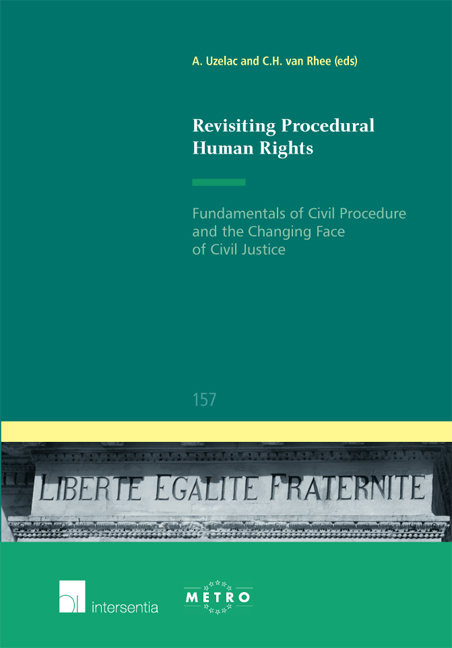 Revisiting Procedural Human Rights
Revisiting Procedural Human Rights Book contents
- Frontmatter
- Table of Contents
- List of Authors
- List of Abbreviations
- Acknowledgements
- Introduction
- The Human Right to Accessible and Foreseeable Justice
- Fundamental Procedural Rights from a National Angle
- Wheels of History: Fair Trial Rights in Historical Perspective
- Equal Justice for all: Empirical and Normative Approaches to Legal Aid and Assistance in Civil and Administrative Cases
- The Paradox of Access to Justice ‒ Empirical Research into the Attitude of the Cantonal Judge Towards Unrepresented Parties in Dutch Civil Procedure
- Access to Justice in Administrative Cases. An Analysis of Cases of the Zagreb Legal Clinic
- Are Financial Burdens Preventing Access to Justice in Southeast European Judicial Systems?
- Ius Commune Europaeum
The Paradox of Access to Justice ‒ Empirical Research into the Attitude of the Cantonal Judge Towards Unrepresented Parties in Dutch Civil Procedure
from Equal Justice for all: Empirical and Normative Approaches to Legal Aid and Assistance in Civil and Administrative Cases
Published online by Cambridge University Press: 13 October 2018
- Frontmatter
- Table of Contents
- List of Authors
- List of Abbreviations
- Acknowledgements
- Introduction
- The Human Right to Accessible and Foreseeable Justice
- Fundamental Procedural Rights from a National Angle
- Wheels of History: Fair Trial Rights in Historical Perspective
- Equal Justice for all: Empirical and Normative Approaches to Legal Aid and Assistance in Civil and Administrative Cases
- The Paradox of Access to Justice ‒ Empirical Research into the Attitude of the Cantonal Judge Towards Unrepresented Parties in Dutch Civil Procedure
- Access to Justice in Administrative Cases. An Analysis of Cases of the Zagreb Legal Clinic
- Are Financial Burdens Preventing Access to Justice in Southeast European Judicial Systems?
- Ius Commune Europaeum
Summary
Introduction
In 2011, new legislation was introduced in the Netherlands, increasing the limit for submitting civil claims to the cantonal judge from €5,000 to €25,000. The main motive for this change was economic. Proceedings before the cantonal judge are swift and cheap. However, this change implied also that legal representation for these claims was no longer mandatory and that these claims could henceforth be brought before the court by citizens themselves. This provided an extra argument for the change, since increasing the jurisdiction limit would increase access to justice as well.
The change was brought about by simply changing the amount of €5,000 in Article 93(a) of the Code of Civil Procedure to €25,000, without taking any collateral measures. This means that in these cases as well, the judge is as passive (adversarial) as before without being allowed to show the unrepresented parties the path through the labyrinth of civil procedure and substantive civil law. This might produce the paradoxical result that these parties do have easy access to justice (and will be tempted to handle their cases themselves), but that in the end justice will be denied even if they had a good case, simply because they did not come up with the right claims and defences, where legal representatives would have. Dutch court proceedings are adversarial and judges are not supposed to help parties. However, when a litigant without a lawyer is struggling and is acting against his own best interests, could the judge resist the urge to help him out?
By means of empirical research the attitude of Dutch cantonal judges towards unrepresented parties has been investigated to establish whether these parties are somehow compensated for the fact that they are litigating without legal representation, even though no legislation has been enacted to protect their interests. This contribution describes the results of this research against the background of the position of the judge in Dutch civil procedure in comparison with the position of the court in other countries in similar cases. The outcome will be that Dutch civil procedure should be amended on this point.
Dutch Civil Procedure and the Position of the Court
First a short description of litigation in cantonal cases will be given. This will be followed by an analysis of the position of the court towards the parties.
- Type
- Chapter
- Information
- Revisiting Procedural Human RightsFundamentals of Civil Procedure and the Changing Face of Civil Justice, pp. 287 - 306Publisher: IntersentiaPrint publication year: 2017


